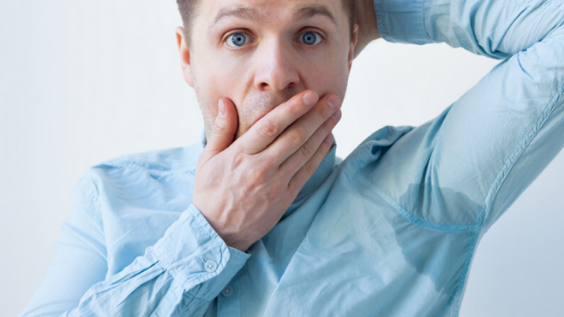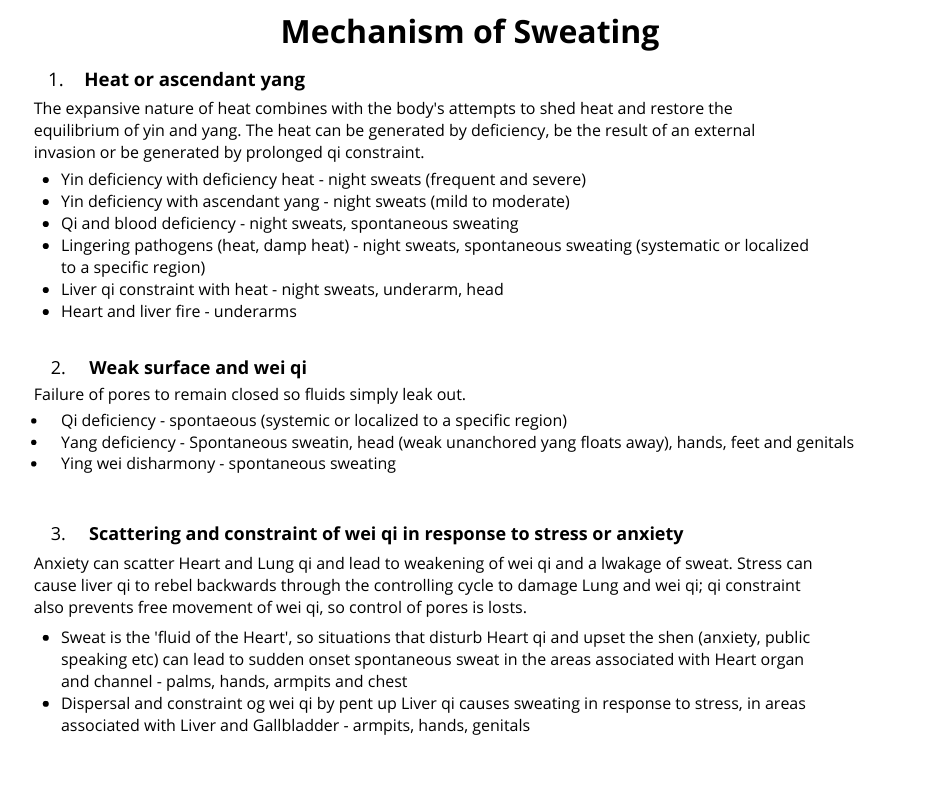
Sweating occurs constantly and is essential to the body as a means of temperature regulation and as a pathway of elimination. Sweat increases in response to elevated environmental or internal temperatures and serves to assist the body in shedding heat by way of evaporative cooling. As external and internal temperature decreases, sweating stops to prevent heat loss. Sweat glands are under control of the autonomic nervous system. Increasing sympathetic nervous system activity in response to stress and arousal can lead to increased sweating.
Sweating is not perceived as a problem until it impacts on daily life. The most likely type of abnormal sweating to present in the Chinese medicine clinic is night sweats, as these are distinctly uncomfortable and can be a significant disruption to sleep and wellbeing. Patients with excessively sweaty palms can also present as clammy hands are considered a liability in business and social situations.
Varieties of Abnormal Sweating
- Night sweats
- Spontaneous sweating
- Unilateral sweat
- Yellow sweating
Physiology of Sweating
Sweating is an important mechanism by which the body maintains the balance of yin and yang. Sweat is derived from body fluids, which in turn are derived from ingested food and fluids. Sweating is closely associated with the function of the Heart, Lungs and Spleen, and is a function of the relationship between yin fluids and yang qi, in particular the yang qi that inhabits the surface, the wei or protective qi. The wei qi functions as a gatekeeper, allowing the escape of excess physiological heat as sweat, while preventing incursion by external pathogens. Similarly when heat needs to be retained the wei qi shuts down the exits and prevents excessive cooling.
Heart
Sweat is the fluid of the heart. The heart governs the blood, and both blood and sweat are derived from the essence of food and fluid. Excessive sweating can deplete the blood and damage the Heart.
Lungs
Wei qi is contiguous with Lung qi, and controls the closing of the pores. Any factor that weakens the Lungs will weaken wei qi and the control of the surface.
Spleen and Stomach
The Spleen and Stomach are the root of acquired qi and thus the qi of all organ systems. Weakness of the Spleen in gathering sufficient qi is a common contributor to weakness of wei qi. The Spleen and Stomach control the limbs, and pathology of the Spleen and Stomach is often implicated in sweating on the hands and feet.
Liver
The Liver plays a secondary role in sweating. The Livers main influence is through the generation of internal heat from constrained qi, and the weakening of the Spleen and qi that results when the Liver and Spleen axis is disrupted. Prolonged Liver qi constraint can generate heat, which in turn scorches the yin, eventually leading to unrestrained and ascendant yang. The expansive nature of heat and ascendant yang, in concert with the body’s attempt to shed the heat, results in sweating.

Pathology
There are two broad types of abnormal sweating, excess and deficiency. The excess types are due to the presence of a pathogen, typically heat or damp heat, that the body is trying to eliminate. The deficiency types of sweating are associated with weakness of the surface and inability of wei qi to keep the pores properly closed, or creation of internal heat and the expansive force of unrestrained yang.
Etiology
External Pathogens
Sweating is a feature of any acute febrile illness, but the sweating is secondary to the other symptoms of fever, cough, diarrhea and so on. Persistent sweating as a presenting symptom is more common in the aftermath of acute febrile illness, and may persist for some time after the initial illness has passed.
Emotional Factors
Any emotional state that weakens the Lungs, Spleen or Heart can lead to sweating. Worry, brooding, sadness, rumination and isolation can deplete the Lungs and Spleen, and lead to the decrease in production of qi, including wei qi. Repeated invasion in response to repressed emotion will also lead to depleted qi. Any situation that disperses Heart qi, such as a sudden or severe shock or prolonged extreme stress, can lead to chronic sweating.
Constitutional Factors
Constitutional or inherited weakness of the Lung and Spleen is often associated with poorly controlled sweating. Patients will also experience general weakness and lack of vitality, respiratory problems such as asthma, and poor immunity. A constitutional weakness of the Heart qi can also contribute. These patients tend to be anxious and nervous individuals from an early age. The sweating is triggered by stress and anxiety.
Drugs
Some medications can cause excessive sweating. These include pseudoephedrine, antidepressants, aspirin and non steroidal anti-inflammatoiries (NSAIDs), hypoglycemic agents, caffeine, theophylline and withdrawal from opiates. Excessive alcohol consumption can also contribute to chronic increased sweating.

Treatment
Acupuncture is the treatment of choice and Chinese herbal medicines are recommended to support correcting the imbalances that may be present.
